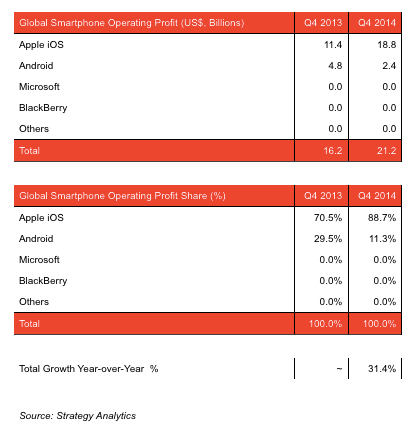The Artiphon INSTRUMENT 1 Is A Symphony, Rock Band And DJ In The Palm Of Your Hand In the lead up to the UK’s national election in May, big tech companies are finding themselves in the crossfire. An article in the Sunday Times (paywalled) lays out more details around UK Chancellor George Osborne’s proposal for a “Google Tax” — a 25% tax on big tech companies’ profits from UK operations that, through creative accounting, have been diverted offshore, saving these businesses millions in tax bills. The tax will be included in the UK Budget, due to be published later this month.
In the lead up to the UK’s national election in May, big tech companies are finding themselves in the crossfire. An article in the Sunday Times (paywalled) lays out more details around UK Chancellor George Osborne’s proposal for a “Google Tax” — a 25% tax on big tech companies’ profits from UK operations that, through creative accounting, have been diverted offshore, saving these businesses millions in tax bills. The tax will be included in the UK Budget, due to be published later this month.
It’s unclear how many millions of pounds would be at stake here, or if there will be any attempt to collect taxes retroactively. When Osborne first alluded in December 2014 to his plans for a “Google Tax”, it was estimated that the UK could claw back as much as £1 billion ($1.5 billion) over five years.
The “Google Tax” of 25% will be higher than the usual 20% corporate tax levied in the UK, and it is expected to be applied only to companies whose annual revenues are more than £250 million ($376 million).
Notably, the Sunday Times writes that the tax will be coupled with much stricter corporate reporting requirements. Among them, companies like Amazon, Facebook and Google will be required disclose revenue and profit figures on a country-by-country basis.
This, in turn, would give tax authorities a clearer picture of just how much money a company earns in each market. Matching that up with other metrics like how many people are employed in each country in turn will help paint a clearer picture of a company’s operations in the country. As the Sunday Times describes it, despite having thousands of employees and business operations in a country like the UK,
“…the tech giants are not deemed to have a ‘permanent establishment’ in Britain. Through this legal accounting ploy, Facebook and Google channel the overwhelming majority of their revenues to their international headquarters in Dublin. The Irish companies then send licensing fees to Caribbean havens, which do not charge corporation tax. Osborne’s diverted profits tax aims to rein in the use of these opaque arrangements.”
Putting a measure like this in place in the Budget, which should come out on March 18, is a fairly obvious strategic move: Osborne is doing his part to show voters that his Conservative Party is cracking down on corporate tax dodgers. But there are others who see this as more of a gesture and too little to make much difference.
“Ultimately this is a tiny proportion of the profits the multinationals he has in mind are generating,” said Toby Ryland, a partner at accountants HW Fisher & Company told the Guardian when the tax was first discussed. “In reality, many of the UK’s double tax treaties with other countries dictate where profits can be taxed. Sweeping measures like this often come to nothing… most multinationals will be able to side-step these new rules without breaking into a sweat.”
Still, at a time when companies like Google are getting scrutinized on other regulatory fronts and subsequently challenged in the public eye, a Google Tax will not be welcomed.
In Q4 2014, Google reported around $1.7 billion in revenues (not profit) in the UK. In 2013, the company paid £20 million ($30 million) tax in the UK at a time when its revenues in the country were £3.6 billion ($5.4 billion).
And it’s not the only one in the spotlight when it comes to how it gets taxed in the UK or more widely in Europe. Amazon sold goods collectively worth more than $6.5 billion in 2013 but paid only $6.3 million in UK taxes. Apple, too, is being scrutinized in Europe for allegedly avoiding paying taxes on some $54 billion in profits.
And unsurprisingly, there is pushback, too. The National Foreign Trade Council, a lobby group that represents some 300 big U.S. companies including Google, eBay and Microsoft, has warned that a tax of this kind will see big tech companies pulling away from further investment in the UK. Others are questioning the legality of some of the tax measures being proposed in Europe.
 In the lead up to the UK’s national election in May, big tech companies are finding themselves in the crossfire. An article in the Sunday Times (paywalled) lays out more details around UK Chancellor George Osborne’s proposal for a “Google Tax” — a 25% tax on big tech companies’ profits from UK operations that, through creative accounting, have been diverted offshore, saving these businesses millions in tax bills. The tax will be included in the UK Budget, due to be published later this month.
In the lead up to the UK’s national election in May, big tech companies are finding themselves in the crossfire. An article in the Sunday Times (paywalled) lays out more details around UK Chancellor George Osborne’s proposal for a “Google Tax” — a 25% tax on big tech companies’ profits from UK operations that, through creative accounting, have been diverted offshore, saving these businesses millions in tax bills. The tax will be included in the UK Budget, due to be published later this month.It’s unclear how many millions of pounds would be at stake here, or if there will be any attempt to collect taxes retroactively. When Osborne first alluded in December 2014 to his plans for a “Google Tax”, it was estimated that the UK could claw back as much as £1 billion ($1.5 billion) over five years.
The “Google Tax” of 25% will be higher than the usual 20% corporate tax levied in the UK, and it is expected to be applied only to companies whose annual revenues are more than £250 million ($376 million).
Notably, the Sunday Times writes that the tax will be coupled with much stricter corporate reporting requirements. Among them, companies like Amazon, Facebook and Google will be required disclose revenue and profit figures on a country-by-country basis.
This, in turn, would give tax authorities a clearer picture of just how much money a company earns in each market. Matching that up with other metrics like how many people are employed in each country in turn will help paint a clearer picture of a company’s operations in the country. As the Sunday Times describes it, despite having thousands of employees and business operations in a country like the UK,
“…the tech giants are not deemed to have a ‘permanent establishment’ in Britain. Through this legal accounting ploy, Facebook and Google channel the overwhelming majority of their revenues to their international headquarters in Dublin. The Irish companies then send licensing fees to Caribbean havens, which do not charge corporation tax. Osborne’s diverted profits tax aims to rein in the use of these opaque arrangements.”
Putting a measure like this in place in the Budget, which should come out on March 18, is a fairly obvious strategic move: Osborne is doing his part to show voters that his Conservative Party is cracking down on corporate tax dodgers. But there are others who see this as more of a gesture and too little to make much difference.
“Ultimately this is a tiny proportion of the profits the multinationals he has in mind are generating,” said Toby Ryland, a partner at accountants HW Fisher & Company told the Guardian when the tax was first discussed. “In reality, many of the UK’s double tax treaties with other countries dictate where profits can be taxed. Sweeping measures like this often come to nothing… most multinationals will be able to side-step these new rules without breaking into a sweat.”
Still, at a time when companies like Google are getting scrutinized on other regulatory fronts and subsequently challenged in the public eye, a Google Tax will not be welcomed.
In Q4 2014, Google reported around $1.7 billion in revenues (not profit) in the UK. In 2013, the company paid £20 million ($30 million) tax in the UK at a time when its revenues in the country were £3.6 billion ($5.4 billion).
And it’s not the only one in the spotlight when it comes to how it gets taxed in the UK or more widely in Europe. Amazon sold goods collectively worth more than $6.5 billion in 2013 but paid only $6.3 million in UK taxes. Apple, too, is being scrutinized in Europe for allegedly avoiding paying taxes on some $54 billion in profits.
And unsurprisingly, there is pushback, too. The National Foreign Trade Council, a lobby group that represents some 300 big U.S. companies including Google, eBay and Microsoft, has warned that a tax of this kind will see big tech companies pulling away from further investment in the UK. Others are questioning the legality of some of the tax measures being proposed in Europe.
 Google’s Android has gobbled up market share world wide, now accounting for over 80% of all smartphone shipped globally. But when it comes to actually making money, Apple is eating all the profits as it continues its focus on premium devices. Today Strategy Analytics said that Apple in Q4 last year accounted for 89% of all smartphone profits, equating to $18.8 billion, with Android taking only 11%, or $2.4 billion.
Google’s Android has gobbled up market share world wide, now accounting for over 80% of all smartphone shipped globally. But when it comes to actually making money, Apple is eating all the profits as it continues its focus on premium devices. Today Strategy Analytics said that Apple in Q4 last year accounted for 89% of all smartphone profits, equating to $18.8 billion, with Android taking only 11%, or $2.4 billion.
